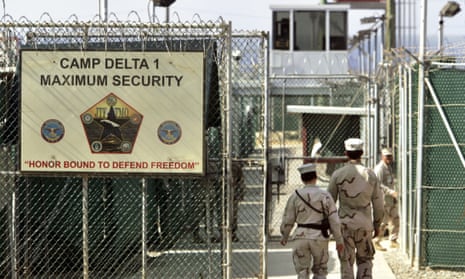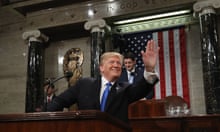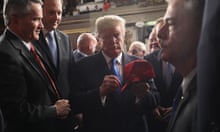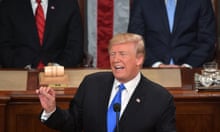Donald Trump has signed an executive order to keep the Guantánamo Bay prison camp open, reversing the policy of the Obama administration.
In his State of the Union address on Tuesday night, Trump said he had directed the defence secretary, James Mattis, “to re-examine our military detention policy and to keep open the detention facilities at Guantánamo Bay”. He added that he expected that “in many cases” captured terrorists would be sent to the camp.
The Trump executive order instructs Mattis, in consultation with the secretary of state and other officials, to deliver a new policy on battlefield detentions, “including policies governing transfer of individuals to US Naval Station Guantánamo Bay” within 90 days.
It is the latest in a long series of policies pursued by Barack Obama that Trump has reversed. Obama signed an order calling for Guantánamo Bay to be closed on his second day in office in 2009, but he was never able carry out that policy to its conclusion.
Obama argued that maintenance of an detention facility beyond the reach of US law undermined American global leadership on human rights. In his speech on Tuesday night, however, Trump said that the move to close Guantánamo reflected softness in the fight against terrorism. And he suggested detention was second best to killing terrorists.
“Terrorists who do things like place bombs in civilian hospitals are evil,” Trump said. “When possible, we have no choice but to annihilate them. When necessary, we must be able to detain and question them. But we must be clear: terrorists are not merely criminals. They are unlawful enemy combatants. And when captured overseas, they should be treated like the terrorists they are.”
He added: “In the past, we have foolishly released hundreds of dangerous terrorists, only to meet them again on the battlefield – including the Isis leader, al-Baghdadi.”
Obama’s adversaries had claimed that Abu Bakr al-Baghdadi had been released from an Iraqi prison facility called Camp Bucca in 2009. However, the insurgent who went on to lead the Islamic State, was released by a military review board in 2004.
Trump did not announce he was about to order the transfer of new prisoners to Guantánamo Bay, and a leaked state department cable to embassies abroad said there were no immediate plans for transfer to Guantánamo. But the president left that option open in his speech.
Q&AWhat is the State of the Union?
Show
The State of the Union is the president’s yearly address to Congress and the nation.
This is when the president gives his or her view (so far only his) on how the country is doing – and usually how well he is doing – while also outlining the legislation he will focus on in the coming year.
The practice was established in article two, section three, clause one of the constitution – the clause states that:
“[The president] shall from time to time give to the Congress information of the State of the Union, and recommend to their consideration such measures as he shall judge necessary and expedient.”
The first address was given by George Washington in 1790, in the then provisional capital of New York City. Washington and John Adams, his successor, both gave the speech in person, but the third president, Thomas Jefferson, decided to give a written message instead.
Subsequent presidents followed suit until Woodrow Wilson personally addressed Congress in 1913. Since then almost all addresses have been given in person, some serving as key historical signposts.
• In 1862, Abraham Lincoln used his State of the Union message to call for the abolition of slavery – something he said was integral to the survival of the country.
• In his 1972 State of the Union speech Richard Nixon called for an end to the Watergate investigation. Seven months later he had resigned over the scandal.
• George Bush introduced the fateful term “axis of evil” in his 2002 address to Congress, four months after the 9/11 terrorist attacks. Bush used the term to tie together Iraq, Iran and North Korea. Adam Gabbatt
“I am also asking the Congress to ensure that, in the fight against Isis and al-Qaida, we continue to have all necessary power to detain terrorists – wherever we chase them down, wherever we find them, and in many cases it will now be Guantánamo Bay.” Trump said.
The Obama administration transferred 200 inmates to other countries, but there are still 41 in the prison complex on a small US-run military zone on the southern coast of Cuba.
The Obama White House blamed Congress for the failure to close the camp, but there was also considerable resistance from the Pentagon and from foreign governments who were reluctant to accept custody of the remaining detainees. Keeping them on the island costs more than $440m a year.
The Guantánamo Bay camp was opened in 2002, as a place where terrorist suspects captured on the battlefield in Afghanistan could be held without access to family or lawyers and interrogated with very few rights and restraints on their captors.
Q&AWhy hasn't Guantánamo been closed?
Show
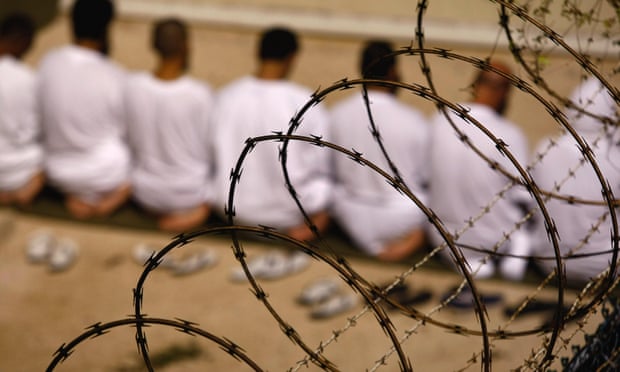
Barack Obama promised to close Guantánamo Bay in January 2009, only to make repeated compromises amid political opposition, bureaucratic tangles, and disputes within his team.
In May 2009, the Democratic-controlled Congress rejected funding to close the prison, calling Obama’s plan too vague. In 2010, New York’s independent mayor refused to host a trial for detainees charged over the 9/11 attacks. Obama continued with and defended several practices of George W Bush’s administration, including indefinite detention and military commissions to try detainees instead of civilian courts. When Republicans retook Congress in 2011, they started adding terms to funding bills, which Obama signed, that prevented transfers or closure.
Meanwhile, Obama’s justice department argued against appeals by detainees fighting for release in court, and the Pentagon moved at a glacial pace to review parole cases for detainees deemed not to be a threat. Faced with hunger-striking detainees, General John Kelly, then commander in charge of the base, oversaw force feeding, and the Obama administration tried to stop the release of evidence.
Obama gradually reduced the number of detainees in the prison, from 242 to 41 over two terms; since Bush’s first term, 731 of Guantánamo’s 780 detainees have been released without charge, to the Middle East, Africa, central Asia and the Caribbean. Donald Trump supports keeping the prison open and has said he would like to “load it up” with detainees. Alan Yuhas
It was supposed to be a place for detaining “the worst of the worst” in the words of the then defence secretary, Donald Rumsfeld, but most of the inmates who ended up there were foot soldiers, or people handed over by warlords for a bounty, or men who found themselves in the wrong place at the wrong time.
The decision to resume renditions to Guantánamo Bay drew outrage from human rights groups who have long campaign for its closure.
“We strongly condemn President Trump’s decision to keep the Guantánamo Bay detention center open,” Homer Venters, director of programs at Physicians for Human Rights, said in a written statement. “The facility is a symbol of US torture and injustice known around the world. It represents the unlawful, immoral, and harmful regime of indefinite detention and should be shuttered immediately.”
